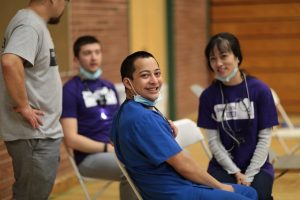Revised Common Lectionary Reflection, Proper 10 (15), Fifth Sunday after Pentecost, Year C
July 14, 2019
Lessons: Deuteronomy 30:9-14; Psalm 25:1-10; Colossians 1:1-14; Luke 10:25-37
Theme: God’s faithful and generous people learn that in our vocational callings the command to love God and neighbor insists that we practice mercy.
Key Scripture: He answered, “You shall love the Lord your God with all your heart, and with all your soul, and with all your strength, and with all your mind; and your neighbor as yourself.” – Luke 10:27
Preaching/Teaching Reflection
 We live in a contentious world where people are sharply divided on many issues. Worse yet, folks are often so angry and polarized that talking about differences of opinion is extremely difficult. Part of the problem is that it feels good to be “right.” Nobody likes to be wrong, so our egos take over and employ all kinds of fun justifying, finger-pointing, and avoidance tactics to land squarely in the “right” on a given issue. Even when we say “I don’t want to argue or debate,” the real motivation behind that statement is often the scary possibility that we might have to open our minds and change them.
We live in a contentious world where people are sharply divided on many issues. Worse yet, folks are often so angry and polarized that talking about differences of opinion is extremely difficult. Part of the problem is that it feels good to be “right.” Nobody likes to be wrong, so our egos take over and employ all kinds of fun justifying, finger-pointing, and avoidance tactics to land squarely in the “right” on a given issue. Even when we say “I don’t want to argue or debate,” the real motivation behind that statement is often the scary possibility that we might have to open our minds and change them.
Our focus this month is on the stewardship of vocation. We are all called to love God and serve neighbor through our individual vocations. This call is not just once-and-done, or just when we think about it, or when it’s convenient, or when it’s expedient; it’s a 24/seven/365 proposition. And yes, fellow disciples, this is not always an easy thing. It requires perseverance, focus, and a mercy mindset. Jesus tries to communicate this truth to the lawyer in our gospel lesson (Luke 10:25-37) using the parable of the “Good Samaritan.”
The lawyer wants to be in the “right” crowd. Even after he answers Jesus correctly and is told “…do this, and you will live,” he wants to justify himself. So he asks Jesus, “And who is my neighbor?” Big mistake! In fact, it’s parable time, that great storytelling/teaching opportunity where Jesus leaves us all with more questions than we had at the outset. This great story is no exception, leaving us with precious little room to justify our willful and sinful human predilections.
This parable is incredibly rich; however, for our purposes let’s apply the teachings to practicing mercy in our daily lives and vocations. Think about traveler leaving Jerusalem who is robbed, beaten, and left for dead. That person could be anyone of us at any given time. We are all just one breath away from an accident, a catastrophe, or a medical diagnosis that knocks us off our feet and unmoors us from our illusions of safety and security. When that happens and we are left helpless and in need, we quickly appreciate the value of interdependence and community.
The priest and Levite were upstanding members of society. We aren’t given the exact reasons these two pass by on the other side of the road. The priest is in the business of upholding the law, including practicing mercy. Maybe the priest was hurrying to serve in the temple and didn’t want to defile himself by touching blood. He had important work to do, right? And the Levite? Perhaps he, too, was hurrying to the temple for important worship roles. Or maybe he was a judge or teacher with many urgent responsibilities. Whatever the case, both choose to ignore the wounded man without practicing the mercy that is part of their religious praxis and teaching. It is the outcast and foreigner, the Samaritan, who is moved with pity to practice mercy and care for the wounded man without checking his pedigree or being worried about his own plans and progress.
 What does it look like for us to respond to Jesus’ teaching about being a neighbor, about practicing mercy, and about going and doing likewise? Maybe it means being kind to the customer who is unreasonable and getting on your last nerve. Perhaps it involves taking a deep breath and being patient with an unruly and rude client. It could even mean checking your privilege at the door and listening deeply to someone whose life situation is different from yours. It may mean conversing patiently, gently, and openly with a co-worker whose religion or politics is very different from your own.
What does it look like for us to respond to Jesus’ teaching about being a neighbor, about practicing mercy, and about going and doing likewise? Maybe it means being kind to the customer who is unreasonable and getting on your last nerve. Perhaps it involves taking a deep breath and being patient with an unruly and rude client. It could even mean checking your privilege at the door and listening deeply to someone whose life situation is different from yours. It may mean conversing patiently, gently, and openly with a co-worker whose religion or politics is very different from your own.
Whatever it means or looks like, practicing mercy requires being fully present in the moment. It demands that we put the needs of the other above our own and that we look upon all others with mercy—loving our neighbors as ourselves.
In Worship
Consider, instead of a traditional sermon, inviting preselected participants to be interviewed about their role in the “breaking news” Good Samaritan story. Be sure to work with and pray with those who will participate in this effort beforehand. Give them plenty of time to think about how they will embody their characters: the injured man, the priest, the Levite, the Good Samaritan, the innkeeper. Interview them as if you would for a television news show. Then, invite them to switch to their current daily lives and answer these questions:
- How have you seen mercy in action in your place of work or where you have been in the past week?
- Where have you witnessed/experienced where mercy could be better shown—whether these are places or experiences you have encountered personally or have read about or seen in the news?
- What are the challenges/opportunities you face in practicing mercy in the stewardship of your vocation?
- Why do you think mercy is so difficult to practice with intention on a daily basis?
Finish by encouraging/challenging worshipers to go forth and practice mercy in their daily lives and encounters. Pray that the Holy Spirit will equip and guide the congregation to be more merciful and compassionate with all people, including the gathered faith community. Ask for wisdom, patience, and strength to work across differences.
Consider singing Delores Dufner’s hymn To be your presence. The tune is likely familiar. You might also want to incorporate a version of this litany (scroll down to the In Worship section).
With Youth
Consider watching Spike Lee’s Do the Right Thing with your youth. Lee’s iconic film explores issues of racism, anger, poverty, and injustice in the events of one hot summer day in the Bedford-Stuyvesant neighborhood of Brooklyn. This year marks the film’s thirtieth anniversary, and it’s every bit as relevant today. Click here for more information. If you have younger youth, you might want to watch Remember the Titans instead.
With Children
This week’s focus verse is Luke 10:27 – He answered, “You shall love the Lord your God with all your heart, and with all your soul, and with all your strength, and with all your mind; and your neighbor as yourself.”
In today’s gospel the lawyer knows what he must do, and he gives Jesus the right answer. This is called the greatest commandment, and it is first recorded in the Old Testament, but it is still the standard for us today. The lawyer isn’t content with the answer and wants to know exactly WHO qualifies as his neighbor. Jesus doesn’t give him a straight answer but rather tells a story about mercy. So let me ask you: Who is your neighbor? (Entertain all answers and try to expand the definition of neighbor to everyone.) What does it mean for you to be a neighbor? We know from scripture that we have to love neighbors the way we love ourselves. We have to want the same good for them that we want for ourselves. We need to share, care, and be kind to our neighbors. Jesus calls it showing mercy. How can you show mercy to your neighbors this week? Finish with a simple prayer and blessing.
Weekly Stewardship Bulletin Insert
An important component of stewardship of vocation is the practice of mercy. Jesus makes this clear in his conversation with the lawyer in this week’s gospel. How can you be more merciful and loving toward your neighbors this week?
Stewardship at Home
Practicing mercy requires just that—practice. Make this a week to flex your mercy muscles. Begin by thinking of simple ways that you can practice mercy and compassion. Here are a few ideas to get you started:
- In the checkout line, allow the person who has only one or a few items to go in front of you.
- Let someone in front of you in traffic.
- Strike up a conversation with someone experiencing homelessness. Look at them through the eyes of Christ.
- Donate to a cause that practices radical mercy. Go without something this week to make that extra donation—perhaps coffee or lunch purchases.
- Give an extravagant tip to your restaurant server this week.
- Give some new or very gently used clothing to a local clothing bank. New underwear and socks are especially appreciated.
- Talk with someone who believes differently than you about a particular issue. Listen with compassion and mercy. Be truly open to hear them. You may not agree with their perspective, but you can give them your whole attention and try to learn something from the conversation. They may be more open to hearing your perspective, too. Agree to disagree in love where consensus cannot be reached.
2016 Reflection: https://www.stewardshipoflife.org/2016/07/faithful-fruitful-folk/
2013 Reflection: https://www.stewardshipoflife.org/2013/07/the-messy-work-of-neighboring/
Images: Paula Modersohn-Becker, Art in the Christian Tradition; www.inkmedia.eu; and supportPDX, Creative Commons usage license. Thanks!
Note: Reprint rights granted to congregations and other church organizations for local, nonprofit use. Just include this note: “Copyright (c) 2019, Rev. Sharron Blezard. Used by Permission.” Other uses, please inquire: thewritelife@hotmail.com.




Leave a Reply